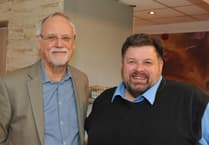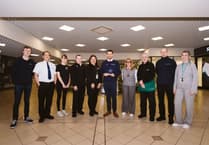The Internet of Things is rapidly changing parts of our lives.
Not too long ago, the only devices with SIM cards were mobile phones, allowing them to connect people with others.
Now there are more SIM cards in other devices than in phones.
They are used in pacemakers, for example, to give vital information to medics over the internet.
Vulnerable people can have them in devices to let others know they’ve had a fall.
Even some high-tech fridges have them to let owners know what’s going out of date and what to buy at the supermarket.
One Manx company is at the forefront of the technology.
Stacuity won the title of New Business of the Year at the Media Isle of Man Awards for Excellence last year.
Founder Mike Bromwich spotted a gap in the market when would-be customers asked him whether IoT devices could be adapted for certain roles. At the time, they couldn’t.
‘Initially, it came about as a lockdown project,’ he said. ‘I moved on my job from Manx Telecom with a view to taking some time out and travelling around the world but the pandemic put a stop to that.
‘So I thought I’d have a go at trying to tackle this problem. The existing mobile networks weren’t sufficiently flexible to meet the growing demands of IoT.’
He then secured funding from angel investors in the island to set up the business.
The company was formed in 2020 and it got the platform ready and integrated into the first mobile operators in March last year.
Mr Bromwich said the Internet of Things had lots of applications.
‘The commonality between them is they are things that need to connect and communicate and exchange messages.
‘The underlying mobile network was designed for consumers. In order to make it suitable for all these applications, the requirements of all those applications are very different. It depends on how much data is passed, security, whether they move around or stay in one place. They all have a different set of requirements.
‘So, for example, a SIM card that you might put in a fire alarm, so it could call the fire brigade if there was a fire, is in a fixed place. It’s never going to move. But it’s really important that, for that one time in 10 years that it needs to work, it does work.
It’s very different from a SIM card that’s in a vehicle tracker which is driving around Europe.
‘The common theme with all this is that all those requirement are different.
‘Stacuity is a business that configures the network to meet the needs of that applications.’
Mr Bromwich said a good example that the company was working on recently was a city in Europe which had scooters that customers can hire at the side of the road.
‘The scooters all have SIM cards in them,’ Mr Bromwich said. ‘If someone stole one of those scooters and put them in the back of a car and drove outside the city, they want to be alerted about that.
‘If you’re the operator of fire alarms and for some reason the fire alarm stops responding, they want to be notified about that.
‘We supply customers with SIM cards and they put those SIM cards in those devices and they have a lot more control than they otherwise would have.’
Traditional SIM cards in devices can be open to security risks and cannot be monitored or updated.
‘Our approach to that is unique,’ said Mr Bromwich. ‘We make those SIM cards a lot smarter and more programmable.’
Stacuity works with telecoms companies that have roaming agreements around the world.
‘We work with existing mobile operators who already have those agreements. We have a number of those effectively wholesale agreements.
‘We started with Jersey Telecom, who are leaders in the IoT space. Effectively, we’ve come up with a mechanism where we can share their roaming agreements.’
Stacuity orders the SIM cards from a manufacturer in Taiwan.
The agreement with Jersey Telecom means that its SIM cards will work anywhere that Jersey Telecom’s do.
The company now works with five operators, which all have slightly different roaming agreements.
It sells to IoT aggregators which buy SIMs in bulk who then sell ‘downstream’ to particular sectors. It also sells directly to individual customers.
The company employs 12 people, half of whom work in the island.
There are salespeople in South Africa, in Europe and the USA.
The technical team, who develop the products, are all based in the island and work from home, although it is possibly that they will work from an office some time in the future, but to retain the flexibilty that home working brings.
‘I’m keen to bring young people into the industry,’ Mr Bromwich said. ‘In my previous business, we made sure we always had apprentices. We always had some up-and-coming stars immersed among the more experienced guys.
‘We haven’t found a way to do that in the new world. It’s not fair to have those people struggling and scratching their heads at home. ‘It’s a bit of an unsolved problem. How do you bring new skills into an industry when everybody’s working from home?’
Mr Bromwich, who is married to Katya and has a 14-year-old daughter, Emily, lives in Ballasalla.
He was educated at Ballakermeen High School in Douglas in the 80s.
He recalled: ‘John Thornley, who was the computer studies teacher at the time, got me into all this in the first place.’
What does Mr Bromwich enjoy about his job?
‘I’m a geek and proud of it. Even though I’ve been working for 30-odd years, I’ve always felt it’s always important to do some hands-on work, and not become someone who just directs others but try to be part of the team.
‘I still spend 25% of my time coding and doing the technical work as a peer with the others in the team.
‘I’m not telling them what to do. We’re just all working together. I enjoy that at the grassroots level but doing so with a broader, leadership perspective.’
Mr Bromwich’s previous company, Partitionware, was acquired by Manx Telecom in 2016. It was set up in 2008 to work with mobile operators to allow their networks to be used by others with travel SIMs, for example, which was a way to avoid a large mobile bill when abroad.
Mr Bromwich did a degree in electronics and computing at Lancaster University, where he met Phil Adcock.
Together they set up what became island-based computer business Domicilium after borrowing money from their fathers to buy computers after they graduated.
Both now sit on the government agency Digital Isle of Man.
‘I think it’s really important that we find a way to try to keep the island’s technical leadership going.
‘There are not many people who came out of the education system as entrepreneurs to form a business which has a long-term future. That’s a shame.
‘At the time when I first set up a business there was no internet. You went to the local accountant, the local bank manager and you ended up quite embedded in the local business community naturally.
‘It would be great to find a way for that to come back to have businesses that retain a tie to the island.
‘One of the reasons I’m on the board of Digital Isle of Man is to promote the skills side. I’m very keen to nurture the next generation.’




